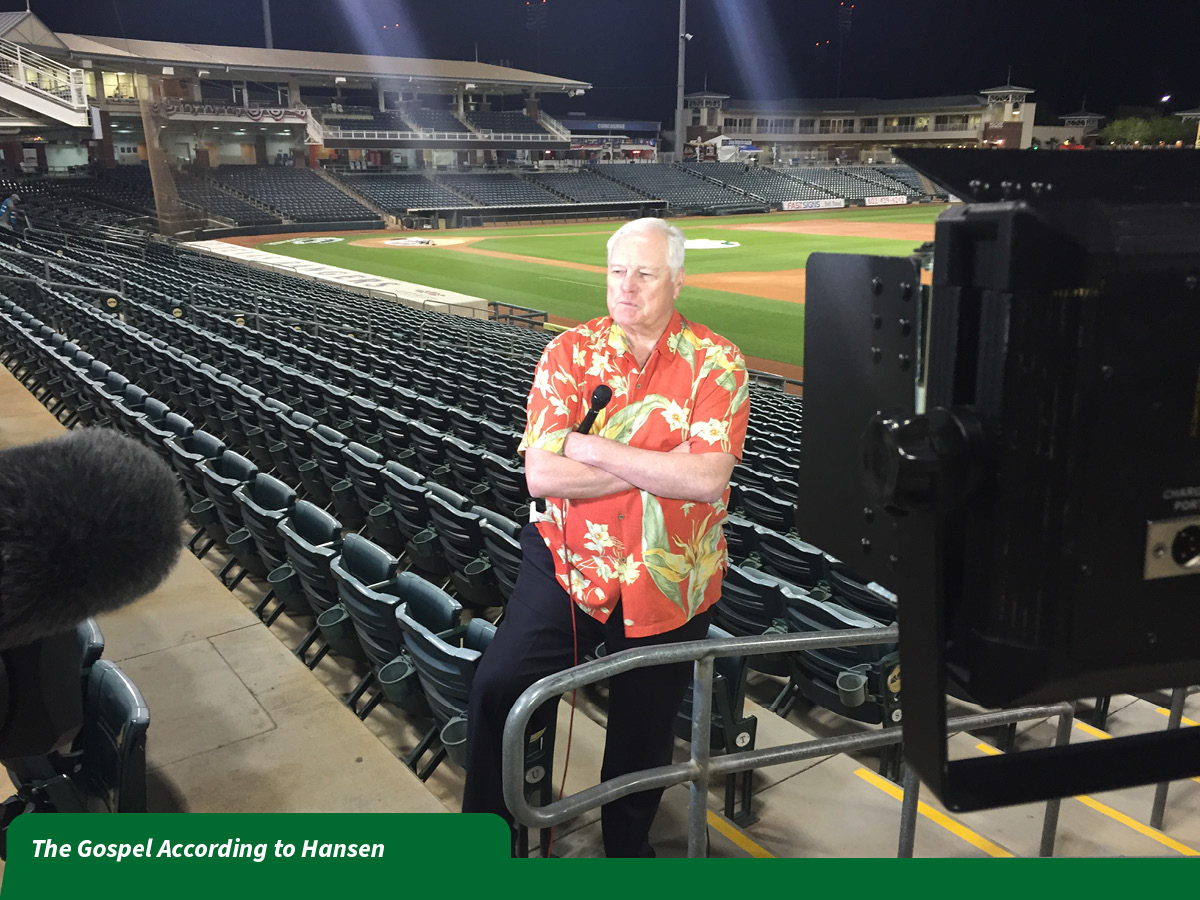
The WFAA news studio, located on a prominate corner of Victory Park, has panoramic glass walls, allowing the public to stand outside and watch live newscasts produced inside. Unbeknownst to me, you’re not supposed to get too close to the window. But I stand face pressed against the glass, peering in for sportscaster Dale Hansen, who I am there to interview this March afternoon. This is the beginning of America’s mass COVID-19 shelter-in-place mandate, which explains why Joyce the security guard, a slim middle-aged woman, trots out and, eyes glued on me suspiciously, tells me to leave – immediately. Although I do notice that in her dedication to duty, security guard Joyce herself is not observing the new social distancing guidelines. After I explain why I am there and show her an email from Hansen, Joyce unstiffens, the firmness melting from her voice. Apparently convinced of my legitimacy, she makes a phone call to get him.
As we stand waiting, Joyce keeps watch for Hansen, and I start feeling the pressure of interviewing a local television legend and my childhood hero. She abruptly opens the door for me to enter the building, and with a whoosh, Hansen’s presence and familiar booming voice spill out with the HEPA-filtered air though he is still across the room. Ambling towards me, his form fills the space as I feel I am shrinking. His great bear of a greeting reverberates as he towers over me.
Then he elbow-dabs me.
And just like that, I relax. We become familiar, and even flout the current strict social distancing guidelines. Just the guys. With that, I follow Hansen into the foyer where we settle into our yellow velvet chairs to begin the interview.
But after only 10 minutes, security guard Joyce pops out of the studio again to inform Hansen that we can’t even be in the foyer.
“Oh, really?” he says, more sarcastic than surprised. Frustrated, Hansen’s response is not aimed at the dutiful Joyce but at the draconian rules she has to enforce. Abruptly, he jumps up and moves our comfy chairs into the hallway, like only a beloved celebrity can do.
“Basically, what they’re saying is they don’t want you to have any human contact for the next year,” Hansen growls, shaking his head.
It dawns on me that he doesn’t feel above the rules like so many people of prominence – he just cares about people – a fact that enables him to connect with millions of fans — myself included.
Hansen is the most popular sports broadcaster in the Dallas-Fort Worth metroplex with 70,000 followers on Facebook alone. This is 15 times the followers of any other sports broadcaster in the area. His trademark confidence and willingness to speak his mind stems, in part, from his success, but also from something he says he learned years ago: that in the full spectrum of life, sports don’t really matter. People will experience suffering, illness, death — that’s important. But sports? That’s entertainment.
He finds comfort in being good at a job where, unlike the rest of the news broadcast, he doesn’t report on mass shootings or economic collapse or pandemic death tolls. “I’m just talking sports or commentaries,” he says. “My confidence comes from the fact that I know, nobody dies.”
For a guy who’s been fired from eight of the 11 jobs he’s held, Hansen has done quite well for himself. He’s received the Radio and Television Digital News Foundation’s Lifetime Achievement Award, a prize reserved for luminaries like Tom Brokaw and Andy Rooney. He has earned a Peabody Award for Distinguished Journalism, and a Dupont Columbia University Silver Baton, the broadcast equivalent to the Pulitzer Prize. And the Mayborn School of Journalism awarded Hansen a Distinguished Professional Achievement Award in 2018. But these awards pale in comparison to a feat rarely accomplished in the fickle world of television broadcasting: He has held the same job for the last 37 years.
Hansen has cemented his acclaim by going beyond sports journalism and into the realm of social and political commentary. His highly opinionated Unplugged news segments purposely stoke controversy, offering an unflinching take on the topical issues of the day, from racial injustice to sexual abuse to gun violence. With them, he has become something of an internet celebrity as his commentaries have gone viral on YouTube and been viewed by millions. Agree with him or not, love him or not, he has found a platform with Unplugged that has elevated his stature from a local sportscaster to a nationally renowned pundit who speaks from the heart.
“Of course, I think I’m right. I wouldn’t say it if I didn’t. Makes no sense to me to be any other way.”
Hansen’s confidence may strike some as arrogance, but it’s an arrogance born out of a passion for sports, a heightened sense of injustice, and a willingness to challenge authority. He credits his prolonged success to a combination of hard work, skill, talent and luck – being in the right place at the right time. “I’m not a religious man,” he says. “But I’ve always had an angel on my shoulder.”
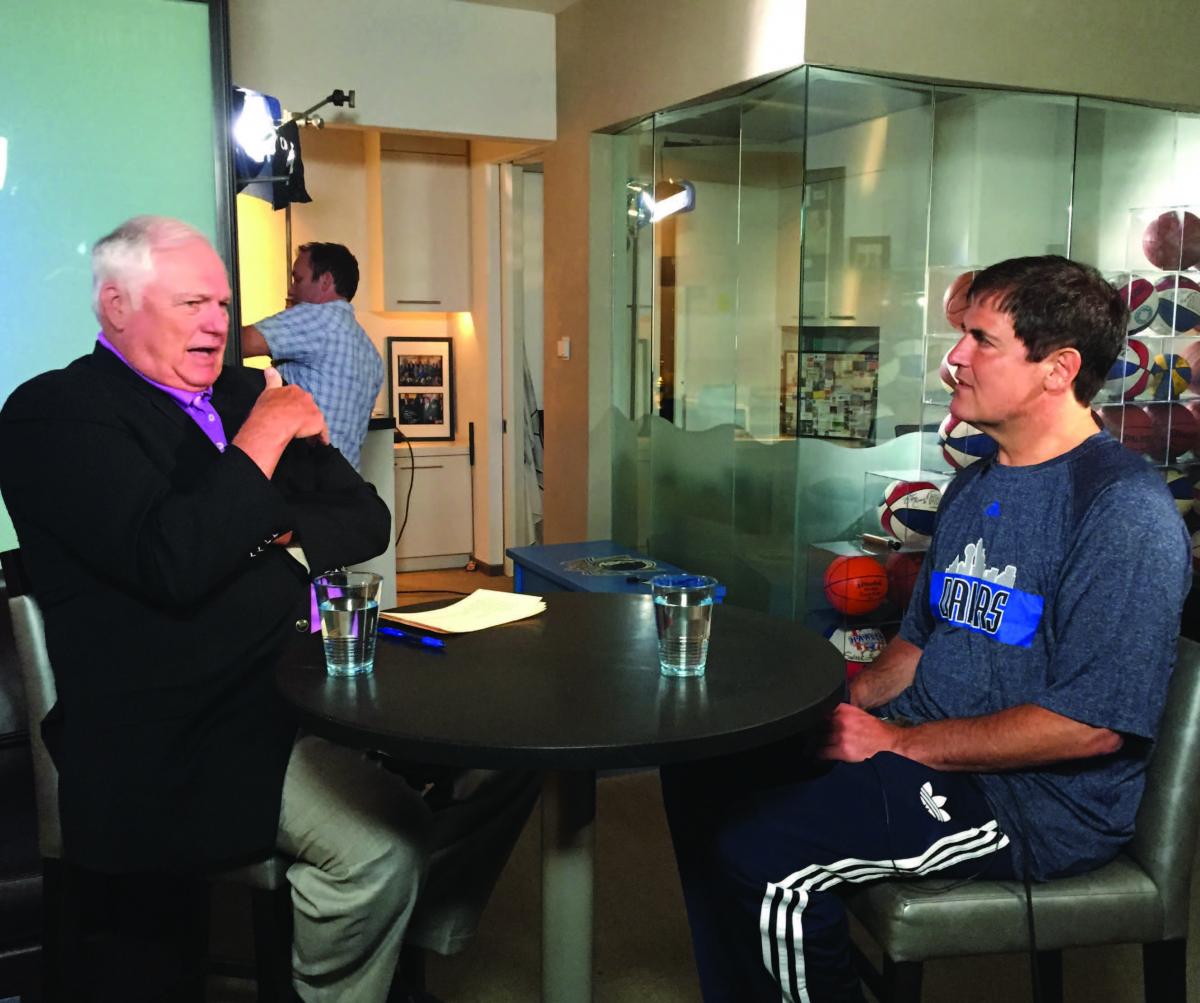
Hansen interviews Dallas Mavericks owner Mark Cuban
GROWING UP IN LOGAN, IOWA, across the street from the grandparents of talk show legend Johnny Carson, had an effect on Hansen. “I was just mesmerized by the fact that I knew a person who knew a person that was on TV.” Hansen has this “entertainer gene” in him, he says, that made him want to be a comedian, game show host, some kind of performer.
But first he would serve in the Navy during the Vietnam War, which he considers one of the defining moment in his life, not only because it would orient him toward a more liberal worldview, but also because it caused him to suffer the loss of his best friend, who was killed within weeks of being deployed to Vietnam.
Returning to Logan after the service, he did not attend college. Encouraged by his former teacher to become a disc jockey, he would listen to the radio all the time, not so much for the music, as for the DJs whose styles he would learn from and critique. He got his first big break at a small radio station in Newton, Iowa in 1972. But reality set in quickly as he realized that being a DJ was not his dream job. “It was just the worst job imaginable,” he recalls.
Even the station manager knew Hansen was miserable, and told him that a news director position had opened up. Although Hanson had no training in journalism and no college degree, the news director felt he was qualified, “because you read,” Hansen remembers him saying. He wasn’t sold on the opportunity, but it would become the turning point in his career.
“I just loved everything about it.” Hansen says. “It was just incredible.”
For his work at the 1000-watt Iowa radio station in a coal mining town of 15,000 people, Hansen received the Iowa Associated Press Investigative Reporter of the Year award in 1974 for his stories about corruption in Newton. That was the moment that gave Hansen pause “to think maybe I can do something here.”
After four years as the station’s news director, Hansen made two moves, each to a small market radio station, before landing at a station in Omaha, Nebraska. But after he was fired, he turned his attention to getting a job in television, even though he had no experience in front of the camera. He interviewed with KMTV, an NBC affiliate in Omaha in 1977. But shortly after the station manager told him that they wouldn’t hire him in the news department without a college degree, the phone rang. It was the weekend sportscaster, says Hansen, and he was quitting. After the station manager hung up, he turned to Hansen and offered him the job. Hansen reminded him that he had just told him he needed a college degree. “’Not to be a sportscaster,’” Hansen recalls him saying. “’You don’t need any education at all.” Hansen credits his hire to that “angel on his shoulder,” being in the right place at the right time — at least, until he was fired. “I’ve had run-ins with almost every news director I have worked for — but those are professional arguments, professional disagreements.”
He moved to Dallas in 1980 and would go to work for KDFW-TV, the Dallas CBS affiliate, until he was fired in 1983. But the same week he was terminated, he was hired by WFAA, the ABC affiliate where he still works today. “I was a bit of a cheerleader in the early days,” he says. “I was kind of building up a following.”
Hansen tried to cover what he thought the audience wanted him to cover. “It’s not my job necessarily to tell people what they should be interested in, as much as it is my job to report on what they are interested in.” And in sports-saturated North Texas market, he quickly figured out that people were interested in him covering the Dallas Cowboys. “What we’re really trying to accomplish here is reaching the most people most of the time. And that usually means talk Cowboys 12 months out of the year.”
His focus would change somewhat in 1986 when he received a tip from a woman who worked in the SMU athletic department. Hansen had used her as a source before, though he thought she wasn’t terribly reliable. But on this one scandal she was right: the university was paying its football players even though they were on probation for similar misconduct.
Hansen’s exposé helped put a stop to that practice; it also prompted an NCAA investigation that resulted in the SMU athletic program receiving the “death penalty,” a one-year suspension from competing, the harshest sanction the governing body could impose. The university reeled under the penalty for years, the program only recently regaining some of its national prominence.
For his efforts, Hansen received a Peabody Award and a du-Pont- Columbia University Award, two of the most prestigious awards in broadcast journalism.
“I hated that story, I hated everything about it, I hoped that it wasn’t true,” Hansen has stated. “I wish that story didn’t have to be told, but I’m incredibly proud of the fact that we were the ones who did.”
The story had another significant consequence: It raised Hansen to a different professional level. “I do think it separated me from being just a typical sportscaster doing ball scores and game highlights,” he says. “Once I did that SMU story, people kind of looked at me differently, and to be honest, I was very comfortable and very happy with that.”
HANSEN IS SITTING BACK IN his chair, relaxed. I’m leaning forward, making sure I didn’t miss anything. Security guard Joyce has not reappeared, apparently content that we are no longer in breach of station rules. Instead, we are interrupted by WFAA weatherman Pete Delkus, a WFAA rock star in his own right. We pause as he passes us and warns us about social distancing. I call him Brian. I should know better.
Even with his celebrity rising, Hansen still recognized the role he was playing on the 10 p.m. news. “I’m the toy department at the end of the show,” he says. “Like tonight – we’re going to have 20 minutes of news that’s going to impact people’s lives. The economy, the fact that some people are going to die, but I’m not going to have anything close to that.”
And yet he yearned to have an impact, bored with reporting game scores and highlights, the bread and butter of sportscasting. But never one to shy from controversy, Hansen took on several sacred cows in his “toy department,” getting into an on-air spat with then-Cowboys head coach Barry Switzer and calling out Texas A&M coach Jackie Sherrill for making disparaging remarks about his Black quarterback, according to an article in Buzzfeed.
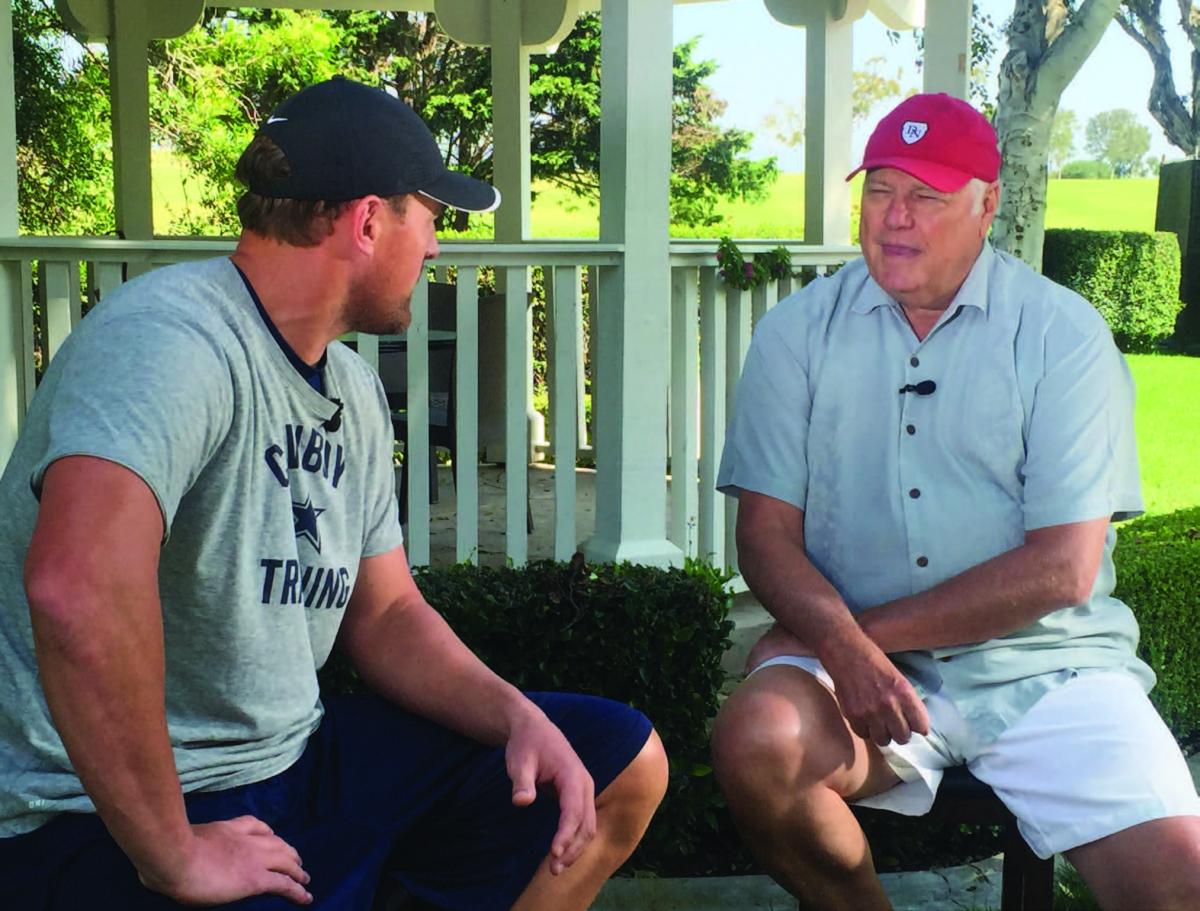
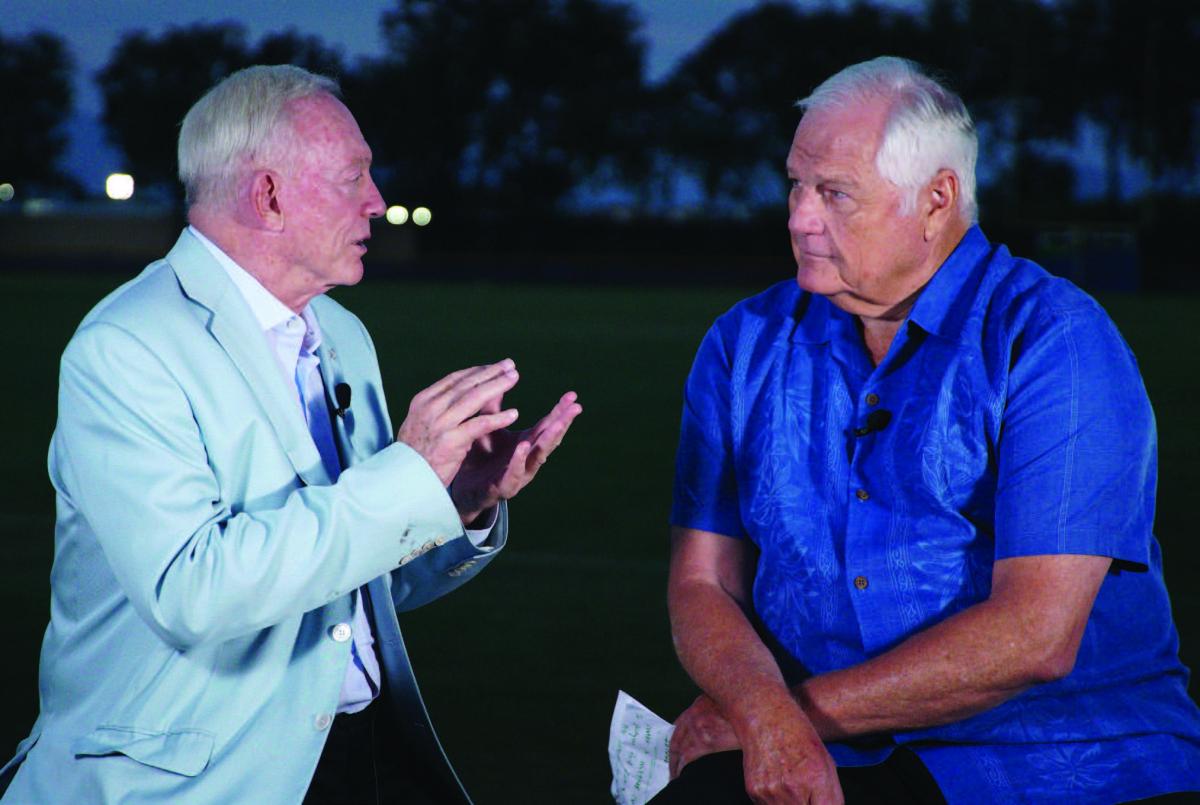
When former Penn State assistant coach Jerry Sandusky was in the news in 2011, falsely declaring he was innocent of sexually abusing dozens of young boys, Hansen shocked his viewing audience when he revealed that he had been sexually molested as a 10-year-old boy in Iowa.
“Sexual abuse of our children is the cancer that lives and walks among us. But a cancer survivor wears their ribbon proudly and we all stand to cheer as they walk by in their annual parade. But who stands to cheer for the victim of a sexual assault? And much like cancer, we all know a victim … We all know somebody. You might not think you do, but I know you do. Because you all know me.”
Hansen had never before spoken about the abuse in public; he even was too ashamed to tell his own parents. With the commentary came a call to action. “Talk to your children, and — more importantly — make sure that your children aren’t afraid to talk to you.”
The response was overwhelming and the piece served as a prologue to an Unplugged commentary that Hansen would later say “defined exactly who I am.”
Former University of Missouri defensive end Michael Sam, winner of the AP’s defensive player of the year in the Southeastern Conference, told The New York Times he was gay. If selected in the NFL draft, he would become the first openly gay player in the league. Media reports already were quoting NFL sources who said Sam’s homosexuality would hurt his standing in the draft. That’s when, on February 14, 2014, Hansen stepped in.
“You beat a woman and drag her down a flight of stairs, pulling her hair out by the roots? You’re the fourth guy taken in the NFL draft. You kill people while driving drunk? That guy’s welcome. Players caught in hotel rooms with illegal drugs and prostitutes? We know they’re welcome…You lie to police trying to cover up a murder? We’re comfortable with that. You love another man? Well, now you’ve gone too far!”
That commentary gained such praise, it led to a trip to the White House, an appearance on Ellen, numerous stories in news publications around the country along with thousands of reactions to the viral video on the internet.
“I had a young man come up to me at a client party the station was hosting, and he cried as he told me his dad had called him the night before, saying his dad hadn’t talked to him in 12 years after he came out,” said Hansen in another WFAA broadcast. “But his dad said, ‘If that old fat Hansen says it’s OK, I guess you and I can figure it out.’ And then we both cried together.”
Hansen says he came to realize that covering sports could be more than just reporting about toys. “Sports play such a huge role in American society and the lessons we apply in sports absolutely apply to life,” he says, “and I was given the opportunity and the vehicle to [talk about] that, so it just kind of grew from there.”
He has sermonized about among other things, gun control (“stop the madness of a nut with a gun”); sexual abuse on college campuses (“no shame in being a victim”— victims shouldn’t be shamed); the hypocrisy of forgiving athletes for their crimes as long as they can play—speaking out whenever the spirit moved him.
The spirit moved him in September 2017 when he spoke out against President Trump who said he wanted professional athletes like quarterback Colin Kaepernick to be fired if they took a knee during the national anthem.
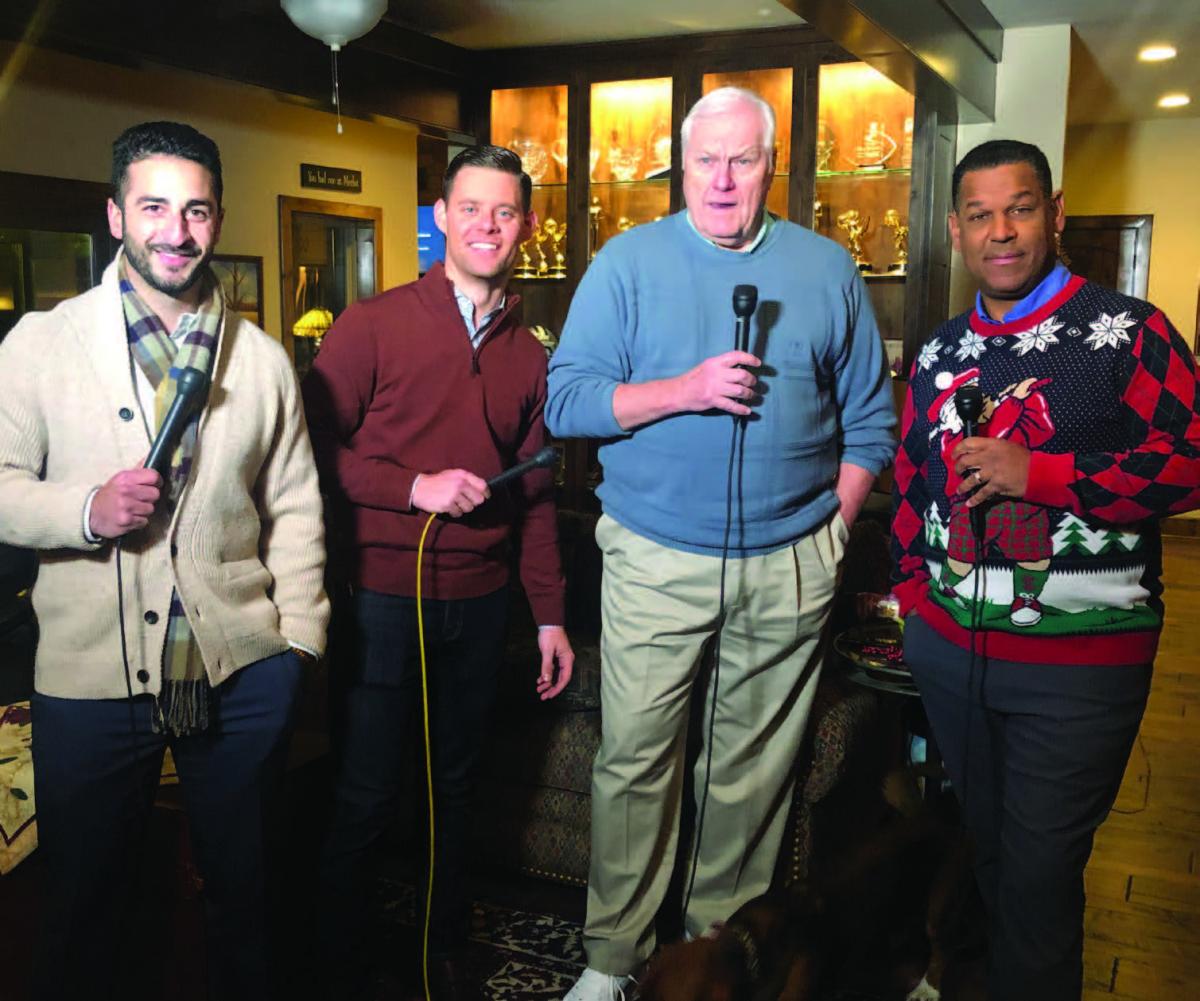
“The young Black athletes are not disrespecting America or the military, they are respecting the best thing about America. It’s a dog whistle to the racists among us to say otherwise…. If you don’t think white privilege is a fact, you don’t understand America.”
Hansen says his strongest motivation for doing Unplugged is his granddaughter Makenzie, who is bi-racial. “I write for Makenzie, trying to make my granddaughter’s world just a little more understanding, maybe a little kinder, and hopefully better.”
One Unplugged segment focused on a racial incident that occurred at a Flower Mound, Texas high school basketball game, where spectators held up a “white power” sign. Not only was this incident reminiscent of Makenzie’s experience being the brunt of racist chants while playing in a basketball game in Flower Mound, but it also echoed the bigotry Hansen had seen as a child in Iowa.
Even though Hansen speaks out about the importance of a free press to our democracy, he won’t hesitate to call out the media when he believes they have gone too far. When former Los Angeles Laker basketball star Kobe Bryant and his daughter died in a helicopter crash in January, Hansen stressed how the media embarrassed themselves in their coverage of the tragedy. The story broke before the families were notified and initial accounts had all four of Bryant’s daughters among the victims. Hansen gets that there is a “thirst to be first” within the media but prizes the higher value of being accurate.
“When we live in a world where the media is referred to as ‘the enemy of the people,’ providing our critics with ammunition hardly makes our industry better.”
Hansen considers his Unplugged segments, and the Michael Sam commentary specifically, as his top memories of his lengthy career at WFAA. “The opportunity this station has given me the last 37 years to write and say the things I do has enabled me to at least try to make a difference,” Hansen recently said on the air. “Because I decided a long time ago, my life has to be about more than ball scores and highlights, and this station, and you, have given me that life.”
The station has given him the autonomy to say what he wants – within reason. “I can’t go out on the air and call Trump a little Hitler,” although he did accuse him of being a draft dodger. “Oh my God, people were up in arms.”
But he says he “knows for a fact” that he has changed the attitudes of some people. “And I’m going to keep trying to do that as much as I can for as long as I can.”
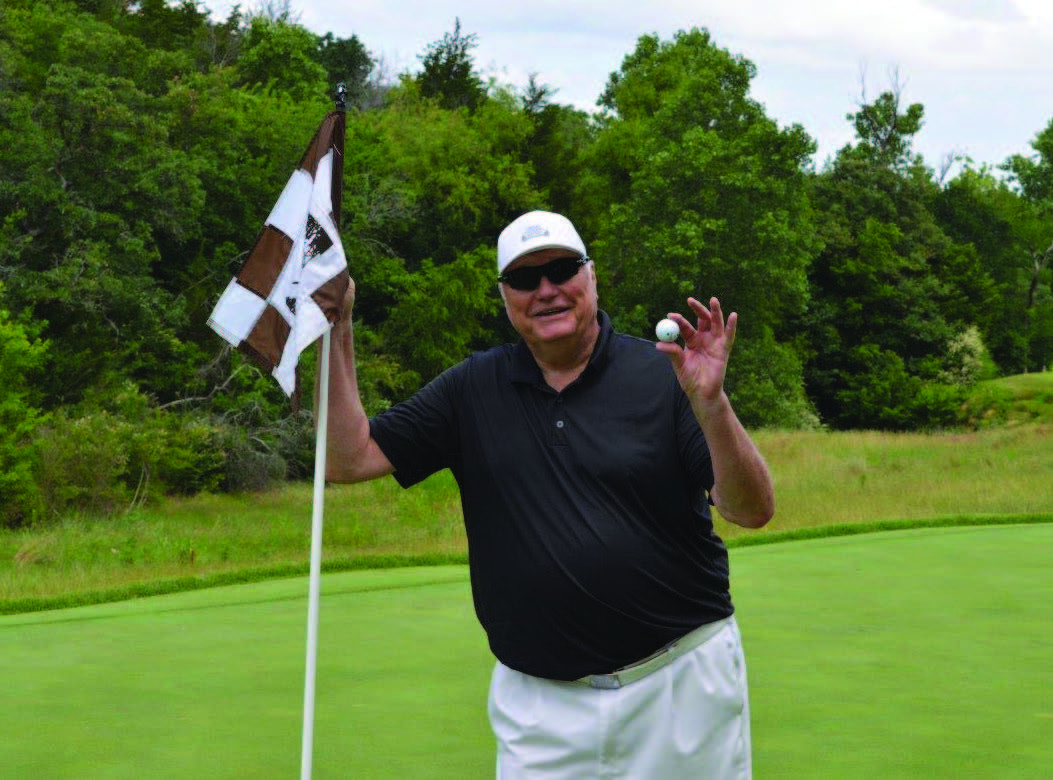
WITH ANOTHER ELBOWDAB OUR interview ends. I walk out of the studio into an empty Dallas. Even security guard Joyce is nowhere to be seen. Victory Plaza, usually crowded with visitors looking for entertaining diversions at the American Airlines Center, is now bereft of people and quiet, as most folks seem to be obeying COVID-19 social distancing rules. And even though there is no Dallas Mavericks basketball to highlight, no Stars game to break down, no fans gathered dangerously close to cheer their teams, that is a good thing. And even though most sporting events have been put on hold, that hasn’t stopped Hansen from preaching his gospel about police brutality, peaceful protests, shut-down orders, and yes, even sports.




